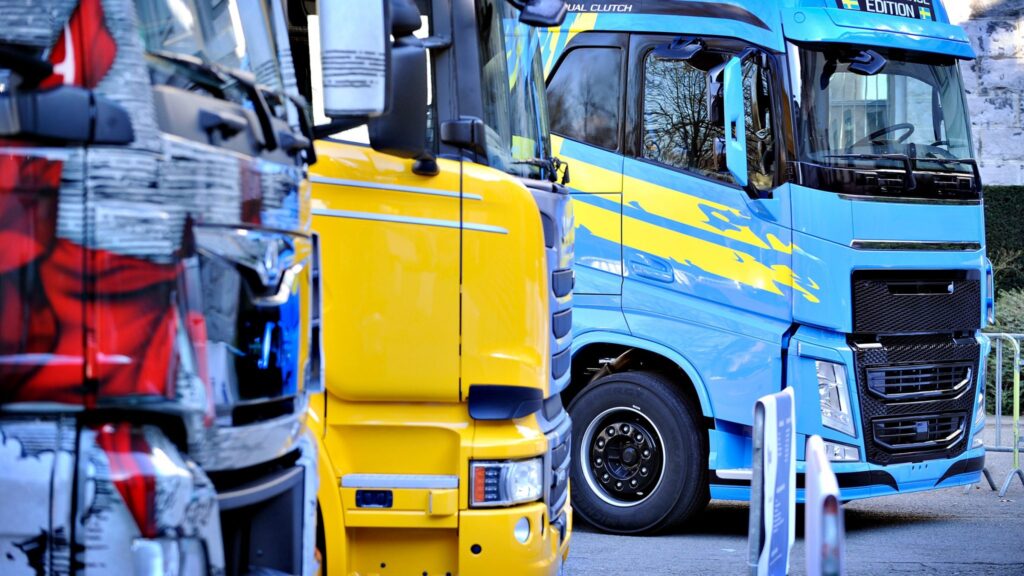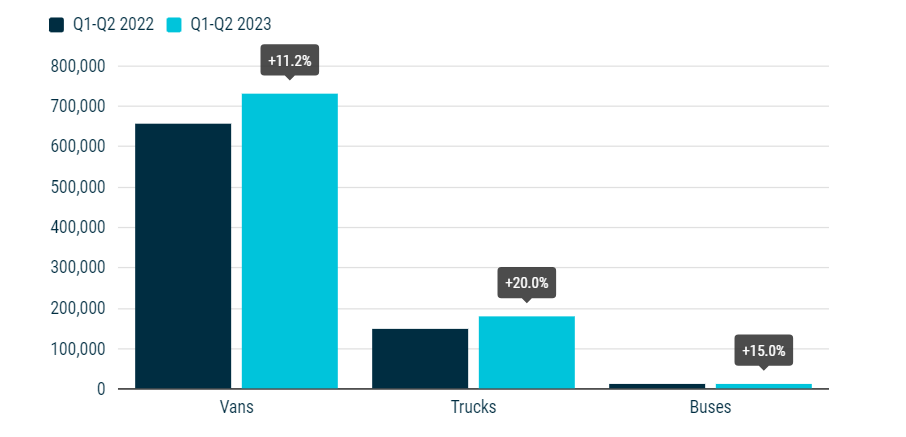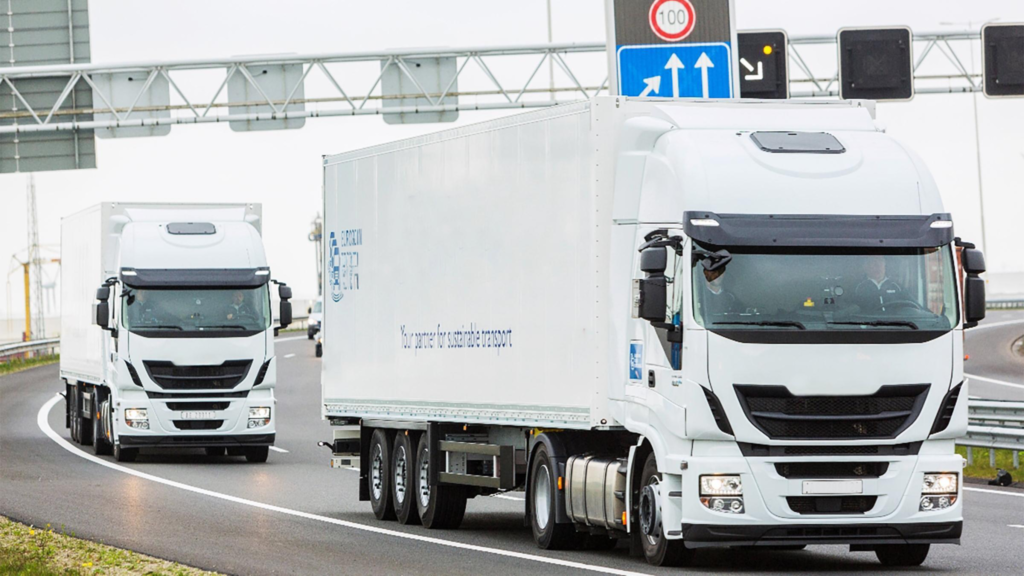In today’s world, heavy-duty trucks play a key role in transportation and logistics. Whether it’s long-distance freight or construction sites, these powerful maneuvers are indispensable. This article will introduce some common heavy-duty truck varieties, brands, and their characteristics to help you better understand this industry.
ONE、Classification of heavy-duty trucks
1. Freight Trucks: Freight trucks are one of the most common heavy-duty trucks used for long-distance freight, material transportation, and cargo distribution. They are usually divided into two types: mainline trucks and city trucks. The former are suitable for highway transportation and the latter are used on city roads and narrow streets.
2. Construction Trucks: Construction trucks are used on construction sites and include concrete mixer trucks, dump trucks, and excavator transporters, among others. These trucks typically have powerful engines and durable frames to handle harsh job site conditions.
3. Trailer Truck: A trailer truck is a truck used to haul large cargo, usually carrying one or more trailers. These trucks are very useful when transporting heavy equipment, construction materials, and other large cargo.
4. Specialty Trucks: Specialty trucks include a variety of special-purpose trucks, such as garbage trucks, fire trucks, military trucks, and rescue vehicles. They are equipped with different equipment and technologies as needed to meet the requirements of various tasks.
The European classification system defines trucks as “motor vehicles with at least four wheels, used for the carriage of goods”. They have a mass of more than 3.5 tonnes.
- Under this system, trucks are either classified in the N2 category (weighing more than 3.5 tonnes) or N3 (weighing more than 12 tonnes).
- N3 vehicles are also referred to as ‘heavy trucks’ or ‘heavy commercial vehicles’.

TWO、Heavy truck brands
There are many well-known brands in the heavy-duty truck market, each with its own unique features and product range. The following are some common heavy-duty truck brands, but please note that there are many others on the market:
Volvo: Volvo is a well-known Swedish truck manufacturer known for its high quality, safety, and reliability.
Scania: Scania is another Swedish truck manufacturer whose trucks offer strong performance and fuel efficiency.
DAF: DAF is a Dutch truck manufacturer whose trucks are very popular in the European market and are known for their low maintenance costs and high-quality engines.
MAN: MAN is a German truck manufacturer whose products cover a variety of different applications, including freight and construction.
IVECO: IVECO is an Italian truck manufacturer that offers various types of trucks, including freight, construction and special purpose trucks.
Mack Trucks: Mack is an American truck manufacturer known for its rugged and durable trucks, often used in construction and excavation projects.
Caterpillar: Caterpillar is an American company that produces construction and excavator trucks known for their powerful performance and durability.
Kenworth: Kenworth is an American truck manufacturer whose trucks are commonly used for long-distance freight and special purposes.
Freightliner: Freightliner is an American truck manufacturer that produces various types of trucks, including freight, construction, and firefighting trucks.
International Trucks: International Trucks is an American manufacturer of trucks for a variety of applications, including freight and special purpose.
Western Star: Western Star is an American truck manufacturer that focuses on the production of heavy-duty trucks, especially trucks for special purpose and heavy-duty applications.
Renault Trucks: Renault is a French truck manufacturer whose trucks are known for their advanced technology and fuel efficiency.
Sterling Trucks: Sterling is an American truck manufacturer with a certain influence in the light and medium-duty truck market.
Blue Bird Corporation: Blue Bird is an American truck manufacturer that focuses on the production of school buses and other special-purpose trucks.
Hino: Hino is a Japanese truck manufacturer whose trucks are sold worldwide for freight and special purposes.
Marbach: Marbach is a German truck manufacturer known for its high-quality trucks and truck components.
Asia MotorWorks: Asia MotorWorks is an Indian truck manufacturer that focuses on producing various types of heavy-duty trucks.
The truck division of Mercedes-Benz, commonly known as Mercedes-Benz Trucks, produces various types of trucks, including freight trucks and special-purpose trucks. Still, Mercedes-Benz trucks are generally better known for their sedans and SUVs, so they’re relatively less well-known in the heavy-duty truck segment.
However, Mercedes-Benz Trucks remains an important truck manufacturer, with its trucks used around the world and having a strong presence in the European market.
THREE、In figures
- 6.2 million – Today, there are more than 6.2 million trucks in circulation throughout the EU.
- 13.9 years – The average age of Europe’s trucks is 13.9 years.289,316 new trucks were sold in the EU in 2021, an increase of 16.8% compared to 2020.
- 52 – There are 52 truck assembly plants in Europe.
- 470,388 trucks were manufactured in the EU in 2021.169,147 trucks (over 5 tonnes) were exported worldwide in 2021, worth €5.8 billion.
- €5 billion – Trucks generate an annual trade surplus of €5 billion for the EU.
- 52% of heavy trucks built in the United States now come from European-owned factories, based on European technology 95.8% of all new trucks sold in the European Union are powered by diesel, and 0.1% by petrol.
- 0.5% – Electrically-chargeable vehicles (battery electric, plug-in hybrid) together represent 0.5%.
- 0.2% – Trucks with electrically-chargeable powertrains represent only 0.2% of the current heavy truck fleet.
- 3,204,468 people are employed in the road freight transport sector.
- 29.8% – The performance of road freight transport (measured in billion tonne-kilometers) grew by 29.8% between 2000 and 2020.
- 150 km – In modern economies, 73% of road freight tonnage is carried over distances of 150km or less, along routes for which no other form of transport would be realistic. Less than 2% gets carried over 1,000 km.
- 61% – Despite the increase in freight transport, fatalities involving heavy goods vehicles decreased by 61% between 2001 and 2019.
New commercial vehicle registrations: 11.2% for vans, 20% for trucks, and 15% for buses in H1 2023.

EU new van sales rose 11.2% to 730,969 units in the first half of 2023 as supply chain problems eased. Spain and Germany contributed significantly to this growth, with truck sales increasing by 26.6% and 15.5% respectively. French sales also edged up 3.6%, totaling 189,948 vehicles.
New EU truck registrations recorded a significant increase of 20%, totaling 179,508 units. Almost all EU markets saw double-digit percentage gains, including the four largest: Germany (+24.8%), France (+12.3%), Italy (+12.6%), and Poland (+10.8%).
FOUR、Characteristics of heavy-duty trucks
Powerful Engines: Heavy-duty trucks are usually equipped with high-power engines to withstand heavy loads and long distances.
Large Capacity: These trucks have huge cargo boxes or trailers that can accommodate large amounts of cargo.
Advanced safety features: Modern heavy-duty trucks often come equipped with advanced safety features such as brake assist, blind-spot monitoring and automatic emergency braking to reduce the risk of an accident.
Fuel efficiency: Truck manufacturers are increasingly focusing on fuel efficiency to lower operating costs and reduce environmental impact.
Driving comfort: Providing drivers with a comfortable driving experience is important because long-distance drivers spend a lot of time on the road. As a result, trucks often feature comfortable seats, advanced entertainment systems, and air conditioning.
Hauling Capacity: Heavy-duty trucks typically have larger cargo boxes or trailers that can accommodate large amounts of cargo. This makes them ideal for the transport of goods, especially over long distances and for the distribution of large quantities of goods.
Load Capacity: Trucks are designed and constructed to handle large amounts of weight and load. This makes them ideal for transporting heavy cargo such as construction materials, machinery and agricultural supplies.
Durability: Trucks are typically designed for long-term use and often operate in harsh road and weather conditions. Their durability and reliability are generally higher than passenger cars.
Long-distance travel: Trucks are often equipped with powerful engines and fuel storage capacity, allowing them to travel for long periods of time, making them suitable for long-distance freight across countries and continents.
Versatility: Trucks can be used for a variety of purposes, including trucking, construction, waste disposal, firefighting, military and special applications, with a variety of configurations and feature options.
Towing Capacity: Some trucks have strong towing capabilities and can pull heavy trailers, trailers or semi-trailers used to transport other vehicles or large cargo.
Customizability: Trucks can often be customized to a customer’s specific needs to suit different industries and uses, including cargo boxes, trailers, special equipment, and more.
Production efficiency: Trucks can improve production efficiency and reduce transportation costs and delivery times in logistics and cargo transportation.
Transport efficiency: Trucks can often operate on a variety of roads and terrains, allowing them to reach rural areas and less accessible places, which is important in some industries.
Cargo protection: Trucks usually provide more cargo protection, which can prevent the cargo from being affected by weather and external environments, ensuring the safety of the cargo.
Despite these advantages, heavy-duty trucks also have some limitations and challenges, such as high fuel consumption, higher maintenance costs and larger vehicle size. Therefore, when choosing a truck or passenger vehicle, various factors need to be weighed based on your specific needs and usage.


